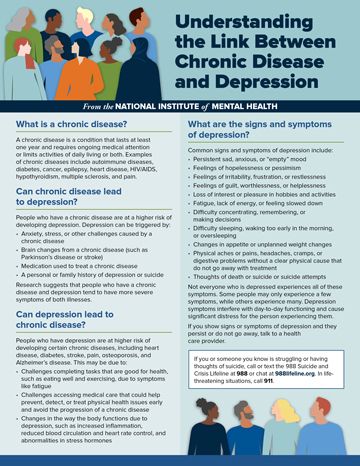Living with a chronic illness is challenging in many ways, and one aspect that often goes overlooked is the impact it can have on mental health. The connection between chronic illness and mental health is complex and multifaceted, but it is an important one to understand for those facing these challenges.
The Psychological Toll of Chronic Illness
Dealing with the physical symptoms of a chronic illness is tough enough, but the psychological toll can be just as significant. Chronic illness can lead to feelings of isolation, frustration, and hopelessness. It can disrupt daily life, limit activities, and strain relationships. All of these factors can contribute to the development or exacerbation of mental health issues such as depression and anxiety.
The Impact on Quality of Life
Chronic illness can also have a significant impact on quality of life, which in turn can affect mental health. Symptoms such as fatigue, pain, and mobility limitations can make it difficult to engage in activities that once brought joy and fulfillment. This can lead to feelings of sadness, anger, and loss. Coping with the day-to-day challenges of a chronic illness can be mentally exhausting, further impacting mental health and well-being.
The Importance of Self-Care
Given the strong connection between chronic illness and mental health, it is crucial for individuals to prioritize self-care. This includes not only managing physical symptoms and seeking medical treatment, but also addressing mental health needs. This may involve seeking therapy, practicing mindfulness and relaxation techniques, and finding support from loved ones and community resources. Taking care of both physical and mental health is essential for overall well-being.
Breaking Down Stigma
Unfortunately, there is still stigma surrounding mental health, especially in the context of chronic illness. Some individuals may feel ashamed or embarrassed to seek help for their mental health needs, fearing judgment or misunderstanding. It is important to break down this stigma and promote open, honest conversations about mental health in the context of chronic illness. Seeking help is a sign of strength and self-awareness, not weakness.
Coping Strategies
There are many coping strategies that individuals can use to manage the challenges of living with a chronic illness and maintain good mental health. These may include setting realistic goals, practicing self-compassion, staying physically active, engaging in creative activities, and connecting with others who understand their struggles. It is important for individuals to find what works best for them and to prioritize self-care as part of their overall treatment plan.
Conclusion
The connection between chronic illness and mental health is a complex and important one to recognize. Living with a chronic illness can take a toll on mental health, but with the right support and coping strategies, individuals can navigate these challenges and maintain a good quality of life. By breaking down stigma, promoting self-care, and seeking help when needed, individuals can better manage both their physical and mental health needs.
Remember, it’s okay to not be okay sometimes, and it’s important to prioritize your mental health just as much as your physical health.
